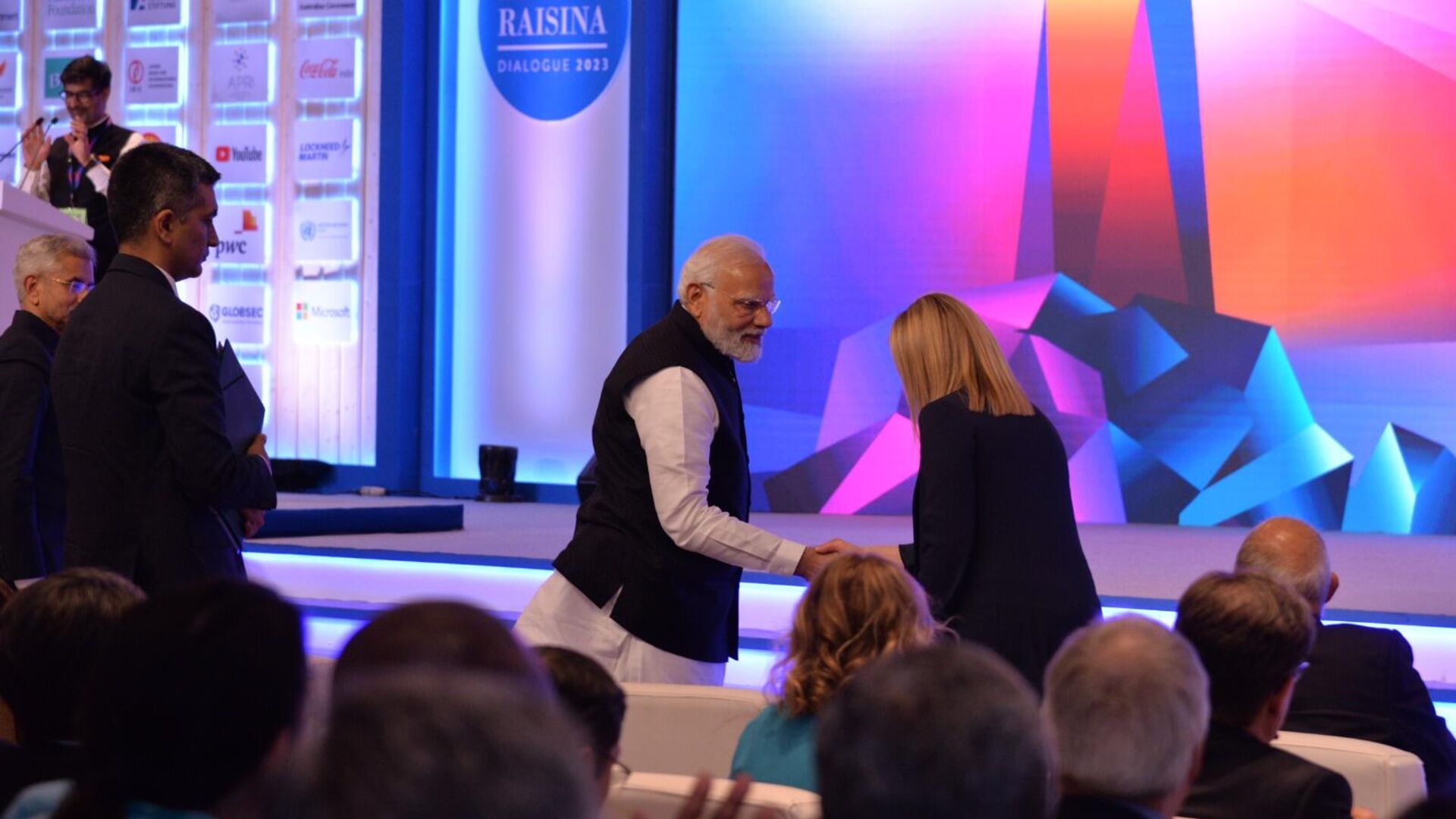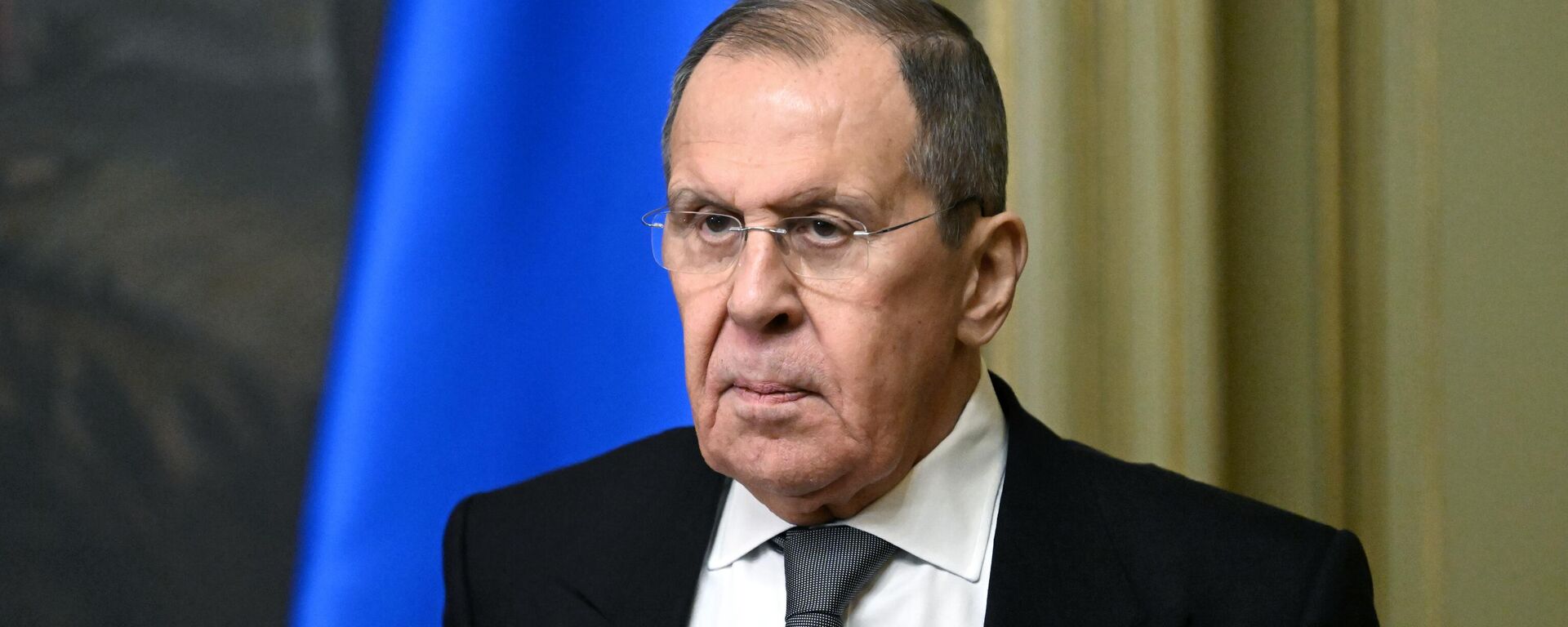https://sputniknews.in/20240228/europe-comes-face-to-face-with-strong-india-russia-ties-at-raisina-dialogue-6691511.html
Europe Comes Face-to-Face With Strong India-Russia Ties at Raisina Dialogue
Europe Comes Face-to-Face With Strong India-Russia Ties at Raisina Dialogue
Sputnik India
The Raisina Dialogue convened by India's Ministry of External Affairs (MEA) last week witnessed a huge participation from Europe, right from political and military leaders to think tankers and businesses.
2024-02-28T19:50+0530
2024-02-28T19:50+0530
2024-02-28T19:50+0530
sputnik opinion
india
russia
new delhi
s. jaishankar
kyriakos mitsotakis
ministry of external affairs (mea)
european union (eu)
the united nations (un)
ukraine
https://cdn1.img.sputniknews.in/img/07e7/03/02/1061357_0:84:1600:984_1920x0_80_0_0_d2861c24f420f387c8abb53277640429.jpg
The Raisina Dialogue convened by India's Ministry of External Affairs (MEA) last week witnessed a huge participation from Europe, right from political and military leaders to think tankers and businesses. New Delhi-based think tank Observer Research Foundation (ORF), the co-host, said that 2,500 delegates from over 100 countries took part in the event. As ministers and delegates from European Union (EU) and Nordic-Baltic states among others convened for various panels, most of them, on expected lines, resorted to criticism of Russia for its special military operation in Ukraine. Greek Prime Minister Kyriakos Mitsotakis, who inaugurated the Raisina Dialogue with a keynote address, remarked that Ukraine was much more than a "local war on European soil", as he continued with western efforts to lobby India against Moscow. Indians Challenge Europeans' Stance on Russia However, the Europeans found their adversarial rhetoric towards Russia challenged by the Indian participants, with External Affairs Minister (EAM) S Jaishankar leading the charge. Responding to a question from an Australian expert at a panel if India was concerned by growing Russia-China ties, Jaishankar took the opportunity to criticise the West's policy to isolate Moscow. If that wasn't enough, there were critical questions posed to European speakers by Indian participants on allowing the US to dictate the terms in their policy towards Russia. A rude shock was delivered to Alexander Gabuev, the director of the Carnegie Russia Eurasia Center, when he asked the audience members at a panel discussion if they had anticipated the special military operation before February 2022. Just two audience members in a gathering of over 100 agreed with Gabuev's views. He noted that New Delhi had once again conveyed to Europeans to buying oil from Russia was in India's national interest."While there were divergence on the issue of NATO expansion and sanctions, EAM was very clear that our relations with Russia has stood the test of time," Vasan remarked.He, however, contrasted New Delhi's stance on the conflict with those of western capitals. "India advocates the respect of sovereignty and territorial integrity of all nations, in accordance with the UN Charter...The nations ought to resolve differences through dialogue and diplomacy," the ex-envoy underscored.‘India Trying to Bring Various Stakeholders Together’ Professor Harsh V Pant, the Vice President – Studies and Foreign Policy at Observer Research Foundation, told Sputnik India that the Raisina Dialogue is one of the few platforms bringing together stakeholders involved in global governance on a single platform. The Indian think-tanker remarked that much like India's last year's presidency of G20, it was the aim of the track II diplomacy event that countries with "divergent views could engage in a constructive discussion to find best possible solution to global problems".
https://sputniknews.in/20231227/rebalancing-of-global-politics-to-get-stronger-lavrov-after-talks-with-jaishankar-5987836.html
india
russia
new delhi
ukraine
the arctic
china
global south
south asia
Sputnik India
feedback.hindi@sputniknews.com
+74956456601
MIA „Rossiya Segodnya“
2024
Dhairya Maheshwari
https://cdn1.img.sputniknews.in/img/07e6/0c/13/138962_0:0:641:640_100x100_80_0_0_2cb44360dbcdf6d84bf4b299cd045917.jpg
Dhairya Maheshwari
https://cdn1.img.sputniknews.in/img/07e6/0c/13/138962_0:0:641:640_100x100_80_0_0_2cb44360dbcdf6d84bf4b299cd045917.jpg
News
en_IN
Sputnik India
feedback.hindi@sputniknews.com
+74956456601
MIA „Rossiya Segodnya“
Sputnik India
feedback.hindi@sputniknews.com
+74956456601
MIA „Rossiya Segodnya“
Dhairya Maheshwari
https://cdn1.img.sputniknews.in/img/07e6/0c/13/138962_0:0:641:640_100x100_80_0_0_2cb44360dbcdf6d84bf4b299cd045917.jpg
raisina dialogue, russia india ties, g7 sanctions on russia, us sanctions, russian oil exports, modi news, modi speech, russia india trade, russia ukraine war, orf, western sanctions, western sanctions against russia
raisina dialogue, russia india ties, g7 sanctions on russia, us sanctions, russian oil exports, modi news, modi speech, russia india trade, russia ukraine war, orf, western sanctions, western sanctions against russia
Europe Comes Face-to-Face With Strong India-Russia Ties at Raisina Dialogue
India says it wants to be a bridge in a polarised world. To that end, India’s flagship foreign policy conference Raisina Dialogue was attended by guests from over 100 nations, including the West and Russia.
The Raisina Dialogue convened by India's Ministry of External Affairs (MEA) last week witnessed a huge participation from Europe, right from political and military leaders to think tankers and businesses.
New Delhi-based think tank Observer Research Foundation (ORF), the co-host, said that 2,500 delegates from over 100 countries took part in the event.
As ministers and delegates from European Union (EU) and Nordic-Baltic states among others convened for various panels, most of them, on expected lines, resorted to criticism of Russia for its special military operation in Ukraine.
Greek Prime Minister Kyriakos Mitsotakis, who inaugurated the Raisina Dialogue with a keynote address, remarked that Ukraine was much more than a "local war on European soil", as he continued with
western efforts to lobby India against Moscow.
Indians Challenge Europeans' Stance on Russia
However, the Europeans found their adversarial rhetoric towards Russia challenged by the Indian participants, with External Affairs Minister (EAM) S Jaishankar leading the charge.
Responding to a question from an Australian expert at a panel if India was concerned by growing Russia-China ties, Jaishankar took the opportunity to
criticise the West's policy to isolate Moscow.
If that wasn't enough, there were critical questions posed to European speakers by Indian participants on allowing the US to dictate the terms in their policy towards Russia.
A rude shock was delivered to Alexander Gabuev, the director of the Carnegie Russia Eurasia Center, when he asked the audience members at a panel discussion if they had anticipated the special military operation before February 2022. Just two audience members in a gathering of over 100 agreed with Gabuev's views.
Commodore (retired) Seshadri Vasan, the Director General of Chennai Centre for China Studies (C3S) and the Regional Director of National Maritime Foundation (NMF), told Sputnik India that the Indian public was firmly behind the government in acknowledging the fact that Russia continues to remain a "valued strategic partner".
"This Raisina dialogue definitely had a European focus as most of these nations were represented. I think our EAM (Jaishankar), while re-emphasising that 'this is not an era of war', was articulate about India's principled stand which exposed the double standards of the West," pointed out Vasan, who was a delegate at the conference,
He noted that New Delhi had once again conveyed to Europeans to
buying oil from Russia was in India's national interest.
"While there were divergence on the issue of NATO expansion and sanctions, EAM was very clear that our relations with Russia has stood the test of time," Vasan remarked.
Ambassador Anil Trigunayat, New Delhi's former envoy to Jordan, Libya and Malta and a delegate at the Raisina Dialogue, told Sputnik India that the "adversarial position" of most of the western nations on the Ukraine issue was well-known.
"They want a defeated Russia and do not seem to be interested in resolving the conflict and address the underlying causes. Hence it is abundantly clear that a logjam would persist," Trigunayat said.
He, however, contrasted New Delhi's stance on the conflict with those of western capitals.
"While New Delhi does not endorse the waging of war, it does appreciate Russia's genuine security concerns... In my view, it was in this context that Dr Jaishankar spoke of provision of options to Russia so that the fighting could end," Trigunayat explained.
"India advocates the respect of sovereignty and territorial integrity of all nations, in accordance with the UN Charter...The nations ought to resolve differences through dialogue and diplomacy," the ex-envoy underscored.
‘India Trying to Bring Various Stakeholders Together’
Professor Harsh V Pant, the Vice President – Studies and Foreign Policy at Observer Research Foundation, told Sputnik India that the Raisina Dialogue is one of the few platforms bringing together stakeholders involved in global governance on a single platform.
"When you look at India's leadership of the Raisina Dialogue, it is very clear that it has emerged as the country’s foremost platform where diversity of views is encouraged. The diversity is expressed in various discussions at the event. Through the dialogue, India is trying to bring together multiple stakeholders, which is quote rare in a world fragmented into East and West or North and South for that matter," Pant remarked.
The Indian think-tanker remarked that much like
India's last year's presidency of G20, it was the aim of the track II diplomacy event that countries with "divergent views could engage in a constructive discussion to find best possible solution to global problems".
"There will be divergences, but only through conversations and engaging with each other can we bridge these divergences. As we have seen, the Raisina Dialogue, with its increasing popularity and growing participation, is succeeding in doing that. There are a very few similar platforms available for the international community today," Pant concluded.



